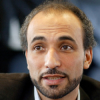Tariq Ramadan

Tariq Ramadan
Tariq Ramadanis a Swiss academic, philosopher and writer. He is the professor of Contemporary Islamic Studies in the Faculty of Oriental Studies at St Antony's College, Oxford and also teaches at the Oxford Faculty of Theology. He is a visiting professor at the Faculty of Islamic Studies, the Université Mundiapolisand several other universities around world. He is also a senior research fellow at Doshisha University. He is the director of the Research Centre of Islamic Legislation and Ethics, based in...
NationalitySwiss
ProfessionWriter
Date of Birth26 August 1962
CountrySwitzerland
The challenge for Muslims in America is to respect the fears of ordinary people while resisting the exploitation of those fears by political parties, lobbies and sectors of the media. To meet this challenge, Muslims must reassess their own involvement, behavior and contributions in American society.
I think many thinkers and activists, even in the Islamist parties like the Muslim Brotherhood, and the people who left the Muslim Brotherhood to follow Abou el-Fatouh, these people do have an understanding that the relationship between religion and the state must be re-thought and re-assessed. They're not going to use the concept of secularism in any straightforward way, because the concept of secularism is still far too loaded in that part of the world.
The fact that this organisation is called the Islamic State reveals something even deeper. In fact, it implies that every single Islamist party in Egypt, Iraq or Tunisia are not really representing Islam and Muslim people. Nowadays, political Islam is going through a crisis, however this crisis is necessary, for it will lead to a changing way of thinking. In order to make it out of this dead-end, reviewing political Islam becomes mandatory.
I think that political parties are fuelling this fear in order to create divisions. The more we bring up fear, the more we neglect real political issues. Political debate in France is crumbling since every single issue is brought to Islam now.
It's clear there is nothing in my record supporting terrorism.
We all cherish freedom of speech, but with a reasonable approach and a reasonable use of it. If we come to this, it is a debate. If not, then it is a power struggle. Who is going to win, the Muslim principles or the Western principles?
I've never suffered because of my heritage in Europe.
Many U.S. organizations believe that I am being barred from the country not because of my actions but because of my ideas. The conclusion seems inescapable.
We've got to get away from the idea that scholars in the Islamic world can do our thinking for us. We need to start thinking for ourselves.
The rich stick together; the poor and the marginalised are thrown together.
The world is a complex place, and the influence of the media in its representation and its power of communication and interpretation is a remarkable amplifier of emotions, and of illusions.
Cultures, along with the religions that shape and nurture them, are value systems, sets of traditions and habits clustered around one or several languages, producing meaning: for the self, for the here and now, for the community, for life.
If religious people deny paradise to their opponents or to 'non-believers,' atheists would likewise seek to eliminate 'dangerous' believers with their 'childish' ways and their heads in the clouds.
South Africa never leaves one indifferent. Its history, its population, its landscapes and cultures - all speak to the visitor, to the student, to the friend of Africa.